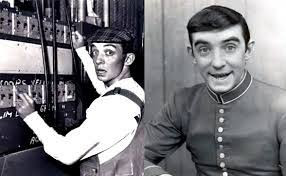After serving twenty-six months in the United States Navy in World War II--twelve in the Pacific theater--Milton Supman took his G.I. Bill benefits and earned a master's degree in journalism in 1949. While attending Marshall College in Huntington, West Virgina, Supman was bit by the show business bug and began working part-time doing standup comedy in local nightclubs and dee-jaying a morning radio show on WHTN-AM.
Supman moved to Cincinnati when he landed a television spot on WKRC-TV hosting a teen dance show called Soupy's Soda Shop--the first in the country. Supman worked under the stage name Soupy Hines. When his show was cancelled, a friend at the station told Soupy about Detroit station WXYZ-TV that was looking for live entertainers to round out its local programming schedule.
The unemployed, twenty-seven-year-old performer legally changed his stage name to Soupy Sales; took his young wife and baby to stay with relatives in Huntington, West Virgina; and drove to Detroit with $10 in his pocket. He auditioned for Channel 7 general manager John Pival to host a daily, children's lunchtime show. Pival was impressed and hired him. Soupy used his fast-talking, improvisational skills to good effect and soon made his program a success. Soupy wanted to show he had the talent to attract more than a kiddie audience.
When an 11:00 PM slot opened up unexpectedly two months later, program director Pete Strand reserved the time slot for Soupy to do an adult-focused, variety show of comedy and music entertainment. Soupy's On debuted on November 10th, 1953.
Unlike his lunchtime show which was roughly outlined and ad libbed giving it a spontaneous flair, the evening show was scripted and well-rehearsed. Soupy and his stage director Pete Strand wrote the nightly opening monologue and comedy sketches each afternoon for the evening broadcast. The show opened with Soupy doing a standup routine followed by a cutting-edge comic sketch and live guest performances by some of the best jazz muscians of the era.
Soupy was a jazz lover living in a jazz town. Detroit at that time was the home to twenty-four jazz clubs before urban renewal in 1959 wiped out the Black Bottom and Paradise Valley neighborhoods where most of the jazz clubs were located. Soupy's nighttime show soon became a scheduled stop for jazz performers like Dizzy Gillespie, Lionel Hampton, Billie Holiday, George Shearing, Della Reese, Charlie Parker, and Miles Davis, who was living in the Detroit area at the time.
Soupy's house band "Two Joes and a Hank" led by Hal Gordon had some chops too. Guitarist Joe Messina and drummer Jack Brokensha later became members of Motown's Funk Brothers. Rounding out the group was Joe Oddo, who played bass, and Hank Trevision, who played piano. Soupy's theme song was Charlie Parker's "Yardbird Suite."
Soupy portrayed an array of comic characters like belching Sheriff Wyatt Burp, European crooner Charles Vichysoisse, Colonel Claude Bottom, and Western cowboy hero The Lone Stranger. Other performers were Clyde Adler who played Indian mystic Kuda Dux and Mississippi gambler Wes Jefferson; character actress Bertha Forman, with fifty years of show business experience, played Soupy's mother-in-law; attractive blonde Jane Hamilton played ditzy literary critic Harriet Von Loon and hip-swinging floozy Bubbles, Soupy's on-screen wife.
 |
Detroit's most recognized voice actor Rube Weiss--announcer for Detroit Dragway commercials and the official Hudson's department store Santa for many years--played Charlie Pan and the Lone Stranger's sidekick Pronto.
 |
| Rube Weiss |
Soupy and his troupe pioneered late-night comedy shows and paved the way for programs like Saturday Night Live. His show was before the age of videotape and only one Kinescope segment (a fixed 16mm camera filming a TV program directly from the screen) survives from the show which is linked below. Soupy interviews trumpeter Clifford Brown at the end of Brown's performance.
The final episode of Soupy's On aired November 27, 1959. Soupy had done 3,300 morning and evening shows for WXYZ in six years when his variety show was cancelled. At the time, Soupy was the highest paid celebrity in Detroit television. When the station declined to renegotiate Soupy's contract, he was free to shop his talents in Hollywood.
In a statement to Detroit local media, Soupy took a moment to make it real. "I've been working in a state of exhaustion for years. My workday begins at 9:00 am and ends at 2:30 am. I get three hours of sleep at night and another two hours in the afternoon. You wear a little ragged after awhile. I see my fans more than I see my own family," Soupy said. "But let's face it. Here in Detroit, local live television is dying because the networks are producing more of their own programming and crowding out local talent."
Soupy Sales relocated to Los Angeles and appeared in some television episodes and several movies but never became a television or movie star in Hollywood. He wasn't leading man material, and his face was too well-known for him to be a convincing character actor. But he recreated himself as a "TV personality" and made a steady living as a panelist on the game show circuit doing programs like Hollywood Squares, $20,000 Pyramid, To Tell the Truth, and What's My Line.
Here is the only surviving clip of Soupy's On from 1956 featuring jazz great Clifford Brown.
















